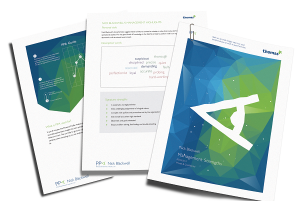

Written by DATS Recruitment Director, Kwesi Ackah.
Not many hiring managers can boast a 100% success rate. Almost all of us can admit to having recruited promising individuals that further down the line have not met expectations, whether that be in terms of performance, personality, motivation or loyalty.
No matter how well-practiced you are at recruiting new temporary or permanent team members, it remains a difficult task. Candidates can look great on paper, come across well at interview stage and sail through the hiring process with unrivalled enthusiasm. But fast-forward a number of weeks or months and frustratingly, you find that the same individual isn’t quite meeting your hopes or expectations.
If you’ve ever experienced this kind of disappointment, rest assured you’re not alone.

The challenge
But just why is it so hard to find people that tick all the boxes? Especially when you’ve taken the time when writing job specs and conducting interviews, to be clear and transparent about the role, your company and its culture? Do candidates expand upon the truth or simply tell you what you want to hear? Well, maybe the odd one. But normally, the reasons behind your new hire not working out are a little more deep-seated…
You see, the most common reasons for an unsuccessful hire are not linked to inexperience or a person’s ability to perform their duties. Ultimately, you can learn from a CV or interview, and a few standard competency-style questions, whether someone has the credentials to carry out a specific role. You can further endorse that information through references and background checks.

The problems that usually lead to issues further down the line are in fact much harder to identify throughout the standard hiring process. And that’s because they’re traits not easily pinpointed – in reality, they’re almost impossible to draw out of a person in an interview situation and even more difficult to detect on a CV.
Attributes that normally mean a new recruit doesn’t fit the bill include things like their motivations, their suitability for your team and their working style. These features are critical to success for both employee and employer but gaining a true measure of compatibility on this level is not easily achievable during the traditional recruitment process.
Other important considerations include an understanding of what makes an individual feel valued. Are they going to feel fulfilled and appreciated within your team and company? What are their motivations and can your organisation offer them the motivators needed to maximise their performance? How do they like/need to be managed? And is there a chance that you could even find them a challenge to manage?
Often, these factors are not simple to uncover yet are key in ensuring the success of your hire.
So, what can be done in order to unearth this vital information before you take the risky and often expensive leap to offering a position to the wrong person? The answer lies in psychometric testing.
Psychometric testing
Psychometric testing has been around for most of the twentieth century, having increased in popularity towards the latter end. Today, psychometric testing often forms part of a company’s standard recruitment process with some organisations enforcing that every new recruit must first go through a test (or even set of tests) before officially being made an offer of employment. But whether you decide to take the plunge into making psychometric or personality testing a compulsory part of your hiring process, or simply choose to use it occasionally to substantiate your decision between two strong, final candidates, there are a whole host of benefits to implementing it.
What’s not to like?
Psychometric testing comes with obvious advantages such as providing you with a precise overview of the candidate – not only what they think you want to hear in an interview. The questions are worded in a way in which it’s almost impossible to forge an inaccurate result and the answers normally provide a very true reflection of a person’s character and working style.
Psychometric testing has also been praised for being one of the most fair and objective ways of shortlisting candidates. It keeps an element of your process consistent, even when individuals are assessed for differing roles, departments and levels and by several interviewers, all with different opinions.
There are of course less obvious advantages to psychometric testing, too. Many hirers don’t realise that it will save time and money – and not only because you are more likely to hire the right person, first time. Some businesses are now using personality testing right at the beginning of their recruitment process, even before interviews, because they are finding it a great way of whittling down high volumes of CVs, reducing the hours spent on arranging and conducting interviews for individuals that were never going to be a good fit for their culture.
And finally, even when interviewers claim to have a great measure of the individual sat in front of them, why rely on ‘gut feeling’ alone? Whilst gut feeling does have an important role to play in hiring the right people for your organisation, eliminate any doubt, or sell your decision to senior management, by backing up your decisions with data gained from your psychometric testing.
Improve your chances of success
So, take a second to think about your last hire that didn’t work out. Was psychometric testing part of your method for selecting that individual? And if not, had you delved a little deeper into their personality and behaviours, do you think there is a chance that your decision may have been different?
Of course, there is no guarantee, even with psychometric testing, that you’ll employ the perfect hire every time. But by introducing it into your process, psychometric testing has been proven to significantly increase your chances of success.
Thomas International – try it today!
DATS has recently partnered with Thomas International – a leading provider of personality and psychometric testing. Thomas’ psychometric tests have been subject to rigorous scientific testing to determine reliability and validity as psychological assessments.

Using Thomas Job, DATS Recruitment can help you identify the behavioural requirements of any job function to support you, recruit the right people for the right job, identify development needs, restructure roles and redeploy talent. Learn more here.
This is a brand-new service which we are finding is adding great value to our clients’ businesses. We’re providing it not only alongside our recruitment services, but as a stand-alone provision too, meaning that you don’t have to be actively using us for your recruitment to access and benefit from our psychometric testing.
Interested? Get in touch today for a free quote and to discover how simple yet effective our fast, affordable psychometric testing services are. We promise you won’t be disappointed!
Benefits of Apprenticeships
Apprenticeships have long been prevalent in the engineering industry but have grown in popularity in all areas in recent years – maybe owing to the introduction of the Apprenticeship Levy in 2017. According to UCAS, there are now approximately 1500 different job role...
10 Predictions For Engineering Recruitment In 2020
The end of one decade marks a period of reflection, but it also provides a reason to look ahead. British engineering has undergone considerable change in the last 10 years. From the decline in oil and gas production to the arrival of BIM, CAD and 3D printing,...
It’s not too late to get IR35 ready
The changes to IR35 legislation come into effect in just a number of weeks now. Do you feel like you're not yet prepared? Don't worry - there's still time to get ready. And even better, we're here to help!You'll know by now that the responsibility for deciding whether...




